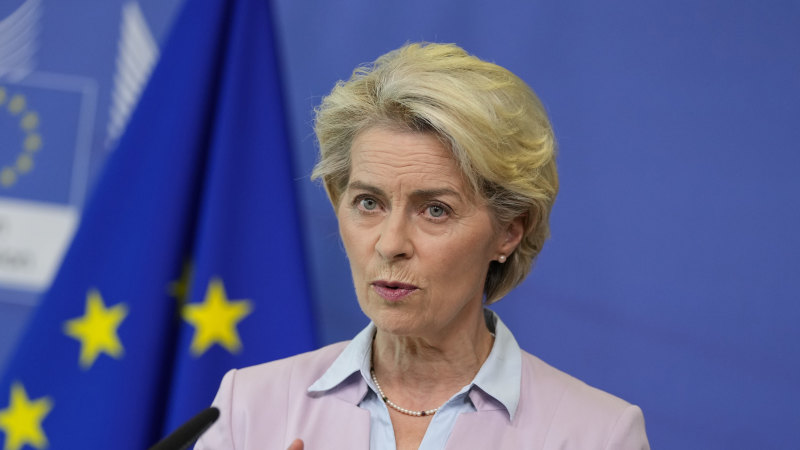London: The head of the European Commission has used a landmark speech to warn member nations they must alter their relationship with China or risk becoming a victim of the same economic coercion currently imposed on Australia.
Ursula von der Leyen said the Chinese Communist Party was seeking to make the world – including Russia – dependent on China. She said Europe’s policy on trade with China was contingent on how Beijing chose to respond to Russia’s invasion of Ukraine and its adherence to human rights.
European Commission President Ursula von der Leyen.Credit:AP
China specialists in Indo-Pacific countries including Australia, Japan and India were consulted for her speech, which comes ahead of her visit to Beijing alongside France’s Emmanuel Macron.
“China sees Putin’s weakness as a way to increase its leverage over Russia and it is clear that the power balance in that relationship – which for most of the last century favoured Russia – has now reversed,” von der Leyen told two think tanks, the Mercator Institute for China Studies and European Policy Centre on Thursday.
“How China continues to interact with Putin’s war will be a determining factor for EU-China relations going forward. How China meets international obligations regarding human rights, will be another test for how – and how much – we can cooperate with China.”
She said Chinese economic coercion of smaller states, including Australia and EU member Lithuania were examples of why Europe needed to change its dealing strategy in line with allies more advanced in countering China.
Russian President Vladimir Putin and Chinese President Xi Jinping exchange documents during a signing ceremony earlier this month.Credit:AP
“As part of this, we will focus on free trade agreements where we do not yet have them – such as with New Zealand, Australia, India, our ASEAN and Mercosur partners – on modernising agreements, such as those with Mexico and Chile, and on better using the others that already exist.”
De-risking, not de-coupling
But she said that Europe was de-risking, not de-coupling, from the Asian superpower as a result of Beijing’s behaviour, as she questioned the motives for President Xi Jinping’s return to the world stage following his self-imposed zero-COVID strategy.
“China has now turned the page on the era of ‘reform and opening’ and is moving into a new era of security and control,” von der Leyen said.
“The CCP’s clear goal is a systemic change of the international order, with China at its centre … and we have seen the show of friendship in Moscow which says a thousand words about this new vision for the international order.”
European Union-China relations were put on hold when Beijing sanctioned a string of members of the European parliament, the European Union’s political and security committee, the European parliament’s subcommittee on Human Rights and the German-based Mercator Institute for China Studies, in a show of solidarity.
She said Europe needed to diversify its tech and clean energy suppliers given it currently relies on China for 98 per cent of its magnesium and 97 per of the lithium required to make its batteries.
Rare minerals are a major point of leverage for Australia in any trade deal it strikes with the EU.
But von der Leyen stressed that nothing was inevitable in geopolitics and that China had a choice to play a responsible role befitting of its size in the international order.
Chinese Premier Li Qiang told the Boao Forum on Thursday that his country was indeed ready to play such a role and as “anchor of world peace”. Other leaders at the forum appeared sceptical.
“It is vitally important that we ensure diplomatic stability and open communication lines with China,” the European Commission president said in her speech.
“I believe it is neither viable – nor in Europe’s interest – to decouple from China. Our relations are not black or white – and our response cannot be either … this is why we need to focus on de-risking – not de-coupling.
“But our story about how we relate to China is not yet fully written – and it need not be a defensive one.”
John Garnaut, who runs an advisory firm and previously led the policy response on foreign interference when advising the Turnbull government, praised the von der Leyen’s speech as “one of the toughest and sophisticated speeches on Xi’s China by any political leader.”
“It is globally significant because it’s coming from the EU, which until now has been years behind Japan, India, Australia and the United States in taking China’s leaders seriously in their words and deeds,” he told The Sydney Morning Herald and The Age.
“In the medium term, this speech raises the odds of a global sanctions response if China is seen to cross the ‘red line’ of providing lethal support to Russian forces in Ukraine.”
Get a note directly from our foreign correspondents on what’s making headlines around the world. Sign up for the weekly What in the World newsletter here.
Most Viewed in World
From our partners
Source: Read Full Article







